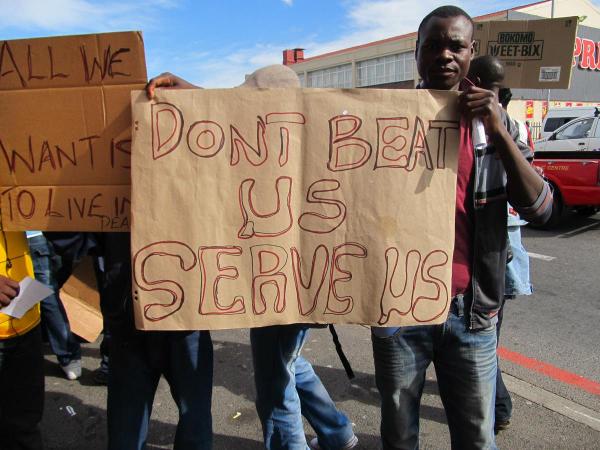

Archive photo of demonstration against Home Affairs. Photo by Veronica Washaya.
3 December 2015
A Zimbabwean man, detained in the Lindela Repatriation Centre in Krugersdorp even though his passport allowed him to be in South Africa, has been released. GroundUp told his story on 25 November. He was released two days later.
The man, who has asked not to be named, was held in a cell in Johannesburg Central Police Station for ten days, before being transferred to Lindela. He was allegedly arrested for being unlawfully in the country, even though his passport allowed him to be in the country. The arrest was allegedly also carried out not by law enforcement officers, but by people wearing neighbourhood watch T-shirts who allegedly demanded R300. After refusing to pay, the man and several other foreign nationals who refused to pay, were arrested by the group and taken to the police station.
On 27 November, the Department of Home Affairs released the man. GroundUp’s article appears to have had a role in his release.
Upon his release, the man — who buys goods in South Africa to sell in Zimbabwe — decided to return to Zimbabwe. In a telephone interview he said, “I am not sure if I will come back to South Africa. My mother is worried about our safety in South Africa. She suggested I stop my buying and selling business and find something else to do here in Zimbabwe. Being in Lindela traumatised me. I am still confused and hurting. It was unfair to be detained when I had not committed an offence.”
“My older brother had to stop working for the whole week to come to the police station several times to try to get me released. He is also psychologically affected by my arrest. He told me he was worried because of the horrible stories we always hear about foreigners who get arrested and held in Lindela. He could not eat or sleep well.”
He said the living conditions in Lindela are very hard. He said the food is not edible, there is no access to phones and the rooms are crowded.
A day before he was released from Lindela, the security guards came to his cell, called out his name and took him to an office. There he was asked if he owned a passport. When he said yes, he was asked to produce it. He showed it to the security supervisor who checked it, gave it back to him and told him he should go back to his cell and wait to be called the following day.
The next day, he was called to the office again where he sat while the security supervisor filled out forms. He was then asked to take his belongings from the storeroom. He was escorted to a Department of Home Affairs car which took him to their offices. At the Home Affairs offices, an official scanned his passport. Satisfied it was authentic, they told him to go. He received neither an apology nor compensation.